Better Than Most is a regular feature of The Business of Giving examining the best places to work among social good businesses and nonprofit organizations.
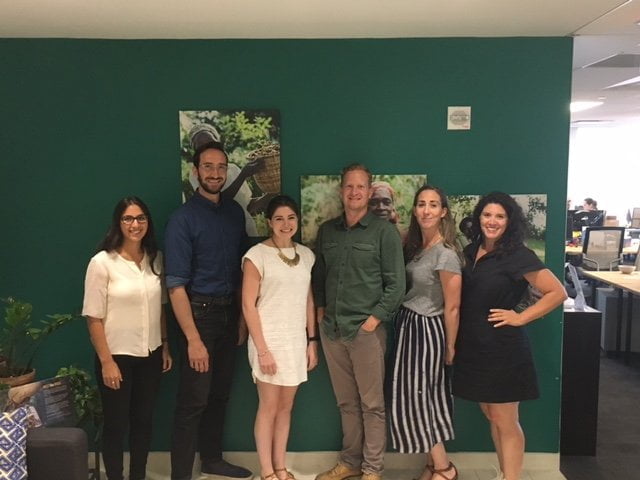
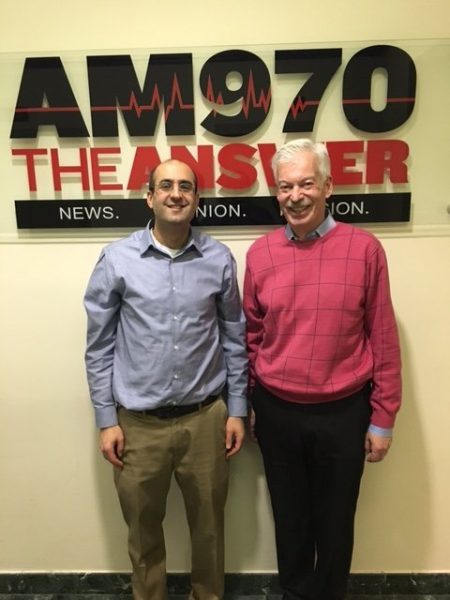
Matt Forti and Denver Frederick
Denver: And this evening, we’re going over to Broad Street in Lower Manhattan to meet some of the staff at One Acre Fund. One Acre Fund serves smallholder farmers in Africa and works to help make them more productive and prosperous. We’ll begin the segment with Matt Forti, their Managing Director and a recent guest on The Business of Giving and then hear from members of the team.
Matt: I think some people equate nonprofits with just good-hearted people out there delivering services. But we really want to borrow from the best of the business world, which is really about good professional development and training. No matter what level you’re at at One Acre Fund, you’re probably going to be spending at our organization 30% of your time in some kind of a formal training program. It’s a leadership accelerant program…
Jillian: What it means, first and foremost, and which we’ll see in every email signature and every document that comes across your desk, is “Farmers first.” That means, everything that we do, we’re always working toward this number one goal of putting farmers first. The values that go into that, like I said, they’re kind of everywhere in the organization.
Some of the main ones we talked about are humble service, so really making sure that we are meeting the farmers where they are. Most of our staff actually work in the field right alongside our farmers. Even our staff in the US office get out to the field at least once a year to make sure that they have a real connection with the farmers that we are serving.
Ross: One Acre Fund really stands out in terms of feedback comparing to other nonprofits I’ve ever worked with. It’s a pretty fundamental thing to know what’s expected of you and where you stand with your managers, and so One Acre Fund does a good job of creating a culture of feedback. The main mechanism for this is the check-ins we have either each week or every other week with our managers, and it’s a space where we check in on sustainability and workload, problems solved through our current projects, and also this key: Dedicate time to big picture thinking. That’s where a lot of the innovative ideas for our teams and for organizations come out of.
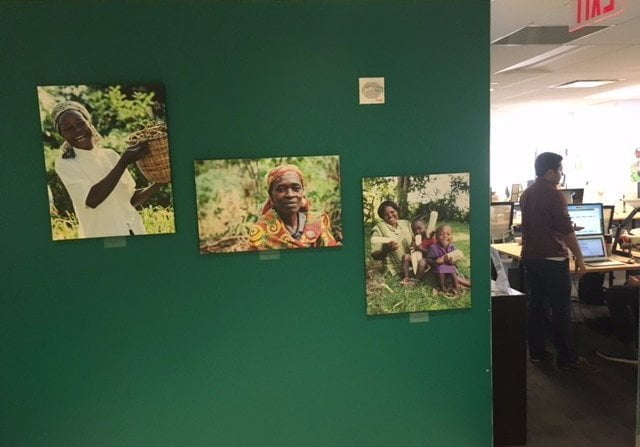
Dave: I thought that broadly applies to our sort of GSD attitude, Get Stuff Done, and then specifically, how that GSD applies to input delivery.
Where the GSD comes in is we have truck breakdowns, we have farmers that live in areas that just don’t have access to the one, the services that we provide, but many, many other services as well. So when it comes to our input delivery, when we say we’re going to get inputs to a farmer on a certain day, it happens. We don’t call a farmer up or send a messenger to say, “Sorry, your inputs are going to come a week from now, a month from now.” They come the day that we say they’re going to come, and that’s how we build our trust.
Emily: The data that we get from this really allows us to tackle different areas that may contribute to an employee’s life cycle at One Acre Fund. We’re able to make better decisions regarding retention, better decisions regarding work-life balance and personal sustainability, and we’re able to implement new programs that really ensure that employees are going to stay with us for a long time and have a successful career at One Acre Fund.
I don’t know of any other nonprofit that uses that type of data to make those decisions. It really ensures that all of our people decisions are grounded in metrics and that we’re able to assess our projects going forward.
Briehan: Four times a year, people have career chats with their supervisors, either informal coffee chats, which you’re reminded and encouraged to do, or a 360 review that we do twice a year as part of our annual evaluation cycle.
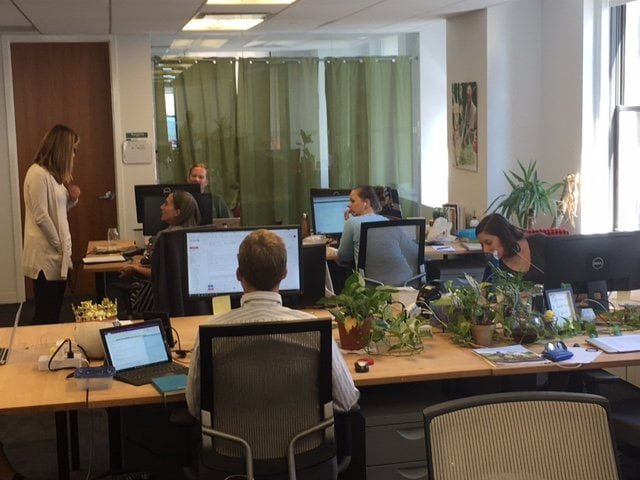
We also have a formal mentorship program to make sure that staff members have access to mentors that they can talk to about their career challenges and their paths that might be available to them.
We also have trainings around the kind of subjects that we feel like are really important to growth. Things like how to delegate efficiently, on how to hire effectively, and even trainings around how you can identify what it is that you want from your own career path, either within One Acre Fund or even if that path were to take you outside. That’s something that we really feel like as we face this incredible challenge of ending poverty, we are able to make sure that people are growing and taking on as much as they possibly can.
Dave: We have people in Kenya, New York, Seattle – we’re kind of all over the place, and we all come together on a big conference call around a different topic every month. And we really dive deep, and everybody prepares to learn about that topic in advance. On the call, it’s sort of like a pop quiz, you know, call out someone, “What would you say about X, Y, Z?” What that does is really kind of build the culture of, “You need to know what you’re supposed to know” sort of a thing. I think that’s a little bit unique. Can be, I guess, high pressure at times, but it really forces you to understand the nitty-gritty of what you’re supposed to communicate externally.
Ross: The model is very scalable as well. We’re able to move from districts and scale the same unit out within countries and to new countries. But having data around what works when we do technology trials and what our impact is, is also really important for getting donors and other supporters onboard. It really is this excitement from donors and other organizations that have enabled us to mobilize our efforts and serve so many farmers.
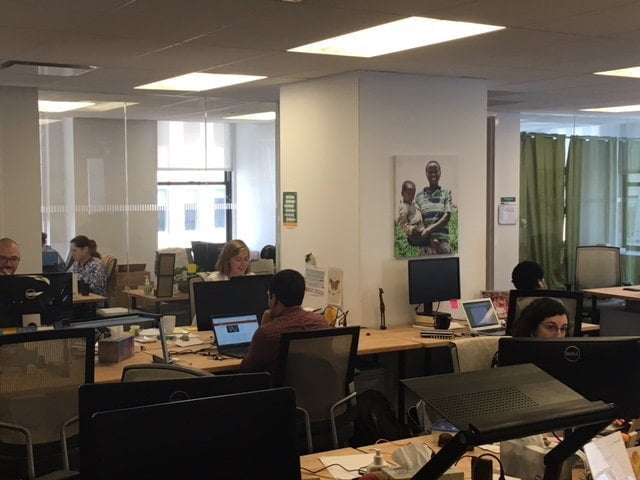
Jillian: Our people teams in general were allowed to really dig in to certain specializations, so whether it was people support or people data or recruitment. And that allowed us to establish stronger relationships with people in different departments so that we could provide better support to them. That also allowed us to really kind of flex these team building muscles, provided me with an amazing management opportunity where I got to work with individuals on my team, with senior leaders in the organization, and really helped build up our team, and then in turn, I’ve been able to provide that opportunity to the people who have been working with me.
Thea: And one thing that I really love about our office space is that even though we are in New York City surrounded by concrete and brick and glass, when you’re in our office space, you really feel connected in many ways to the field and to the farmers that we’re serving. In every single room, there are photos of farmers who are clients of One Acre Fund working in the fields with the crops that they are producing.
Emily: I want to talk about one of my favorite rituals at One Acre Fund. Whenever I go to the field, I try to attend a farmer meeting or a field officer meeting, and one of my favorite aspects of attending these is that they always start out with a song. Often, a dance accompanies it too. But in every meeting I’ve been to, there’s a song about One Acre Fund in the local language or just a really joyful expression of working with One Acre Fund and working with farmers. So that’s one of my favorite things about attending meetings in the field.
Denver: In addition to Matt, I want to thank all the others who participated in this segment: Jillian Joseph, Ross Miranti, Dave Betts, Emily Laser, Briehan Lynch and Thea Aguiar. If you go to denverfrederick.wordpress.com, we’ll have this podcast, a transcript and pictures of the participants in One Acre Fund offices and we’ll put up a link to my full interview with Matt Forti, the Managing Director of One Acre Fund.
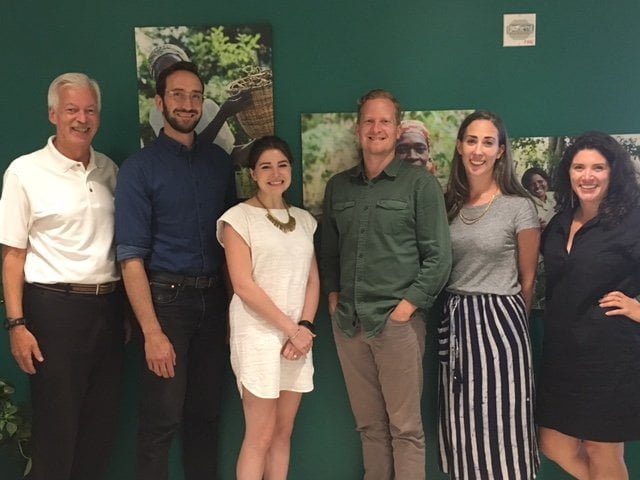
The Business of Giving can be heard every Sunday evening between 6:00 p.m. and 7:00 p.m. Eastern on AM 970 The Answer in New York and on iHeartRadio. You can follow us @bizofgive on Twitter, @bizofgive on Instagram and at http://www.facebook.com/BusinessOfGiving

